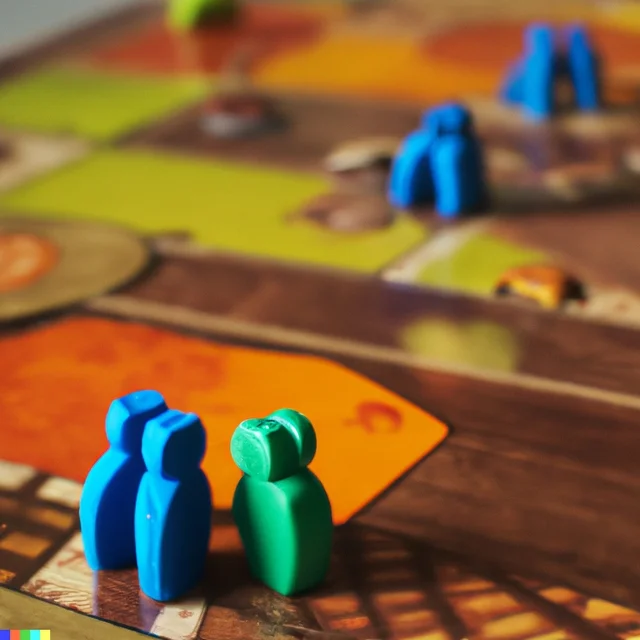Introduction
7 Wonders board game stands out from other popular strategy board games for a few reasons. For one, it’s played in three rounds or ‘ages’ which increases the stakes and forces you to think strategically. Secondly, resources are acquired in different ways – they can be collected, bought or traded with other players. There is also the unique ‘Wonder’ aspect of 7 Wonders where each player has the ability to build their own ancient wonder. This adds an interesting twist to the game – if constructed correctly your Wonder could give you a powerful advantage! The goal of 7 Wonders is simple: acquire as many military points and civic achievements as possible by collecting resources, constructing buildings and trading with other players.
If you are looking for an engaging strategy game, 7 Wonders Board Game offers a unique challenge that will keep players on their toes throughout the entire course of play. The 3 separate ages require strategic decision making on what resources to collect and build, which cards to trade and how best to use special powers connected to the wonder sites. Buying resources at any given market is essential for getting further ahead in the game. If done properly it certainly pays off because opponents may not be able to acquire hard-to-find resources necessary for completeing certain structures. A well-placed card from either your marketplace or civilian section can quickly tip the scales in any particular age — thus winning you a crucial number of victory points!
Overview
7 Wonders is a popular two-player to seven-player strategy board game. Each player takes on the role of a leader of one of the great ancient cities of the Mediterranean, and your goal is to score points by acquiring resources, constructing monuments, and trading with neighbors.
The game components include 7 differently colored cards that represent Wonders of the Ancient World (Gizah, Babylon, Ephesus, Rhodes, Olympia, Alexandria and Halicarnassus). Each set also includes three seven-card decks; each deck consists of several types of Resource cards (stone/wood/brick/ore/glass/papyrus), Guilds cards (which grant bonus victory points based on certain combinations played) and Science cards (for tech-savvy players). Players start with a capital board which shows all available Wonders and provides a place to build the structures related to it; all actions will be done on this board.
Other necessary components are: Leaders and Military cards that offer additional bonuses in certain card plays like having more than 4 military units; Commerce cards which allow you to trade resources between players using coins; Coin tokens representing money you can use during trading with other structures or purchasing Guilds; Population cubes that aid in building structures; Age marker for counting rounds and Victory Points markers for keeping track of scores during play.
In 7 Wonders each card type gives you different advantages depending on how you use it. Resource cards give you access to raw materials used for building wonders and other constructions. Guilds allow players to keep score telling how many points they’ve earned from different combinations of buildings or resources acquired during play. Science Cards provide boosts in researching specific technologies such as Mathematics or Astronomy – these technologies can add special effects and bonuses to your construction projects later in the game. Finally Military imposes penalties on rivals while Leaders extend various benefits regarding cost reduction or victory point acquisition.
Setup
7 Wonders is a quick and simple-to-play board game for 2 to 7 players. To set up the board game, each player should have:
1) A Wonder Board – There are seven uniquely designed Wonder boards, depicting the architectural splendor of one of the seven ancient cities of Mediterranean antiquity: Ephesos, Babylon, Gizah, Rhodes, Halicarnassus, Olympia or Alexandria.
2) A Coin – This coin will be used to pay for resources and other expenses throughout the game. Each player begins with 3 coins at their disposal.
3) Cards – Players will use these cards to construct and expand their city over three consecutive “ages”. Each card provides resources (brick, stone wood or ore), commercial routes (to gain access to goods without spending money), military conquest (which can be used to lay siege against their opponents’ cities). All of these cards also come in colors that correspond with a particular age. For example: brown cards are from the first age; red from the second; and blue from the third. Depending on how many people are playing determines how many cards each player has and what type they get divided by color.
4) Player Cards – These show each player’s current score during a round. The first column shows the point total at the beginning of an age; the second shows victory points earned during that round through their city’s development, by building wonders of their own hand; and any military conquests earned against their opponent. This card also displays who needs to provide resources or goods received due to cascading economic defense benefits associated with each card played by an opponent around them in a clockwise rotation format until your turn comes back around again through which goods/resources need to be paid.
5) An Instructions Booklet – This contains detailed instructions on how to play 7 wonders as well as rules/regulation setup charts for all players involved in playing this game amongst themselves or when introducing new opponents onto the table first time around
Gameplay
7 Wonders is a fun and exciting board game set in the ancient world. Players take turns selecting cards from a hand of available ‘wonders’, each giving them points and advantages to upgrade their cities. The game requires players to think strategically about how to maximize the benefits of their actions – how to secure resources, best use buildings and cards , trade with neighboring cities, and more.
Each player turns acts as a ruler of an ancient civilization trying to build its own wonder of the world. On each turn, they must choose one card from the different types offered such as military, science, guilds, civil structures or raw materials (wood, stone and clay). Each choice provides points that increase your city’s resources but also affects other players in various ways according to which strategic goals they pursue. It is important to track every card played since constructing buildings leads towards earning victory points at the end of the game. Additionally a player may choose to reduce their cost by studying science toward science surplus which can be exchanged for green cards for commodities or services during certain turns.
Military cards allow you to compete with your opponents in building conquest wonders which assert dominance over other closest cities; these militaristic strategies accumulate “shields” that offer decisive bonuses such as movement discounts on resources or extra coins. Civil structures offer long term benefits for using certain resources, while Guild cards let you access advances all players share like trading privileges at reduced prices or bonus points earned for specific resources collected simultaneously from different sources. Towards the end of every age victory point tokens are then gained before moving onto the next epoch where new opportunities will bring fresh choices with potentially higher rewards. With multiple ages– already 3 out of 7– lasting 90 minutes per session, 7 Wonders creates an intense competitive atmosphere while allowing players time enough between turns to think out their options!
Winning Strategies
One specialized strategy commonly employed by players of 7 Wonders board game is drafting the boards. Drafting the boards is a strategy that requires the players to plan their card combinations, allowing them to choose cards in a way that strengthens their overall hand and maximizes the number of victory points earned. In a game of 7 Wonders, each player is able to select seven different boards at random from the deck. Drafting effectively allows these selected cards to be complemented and mutually beneficial. To do this, players carefully examine all potential card combinations with the selections they make in order to best suit their current development board. Along with examining card combinations, paying attention to factors such as military points and resources can also help maximize victory points.
Another strategy involves paying close attention to what your opponents are playing. By analyzing what cards they are selecting and choosing complementing behaviors may lead you ahead in terms of points and resources. Also utilizing resources acquired in earlier rounds by trading off or reacting appropriately to events can net a whole number of extra points for your final score as well.
Variations
Using the “duplicate” cards in 7 Wonders Board Game can open up a range of unique strategies players can use to win. For example, having two or more of the same card will allow you to construct two of the same landmark which not only adds prestige to your civilization but also unlocks alternate resources that increase your scoring opportunities. Additionally, duplicates may be used in certain combinations to achieve special effects such as boosting the power of an adjacent Wonder, equipping additional military units or obtaining new colonists from a distant settlement. This strategic use of copies can allow for creative play and flexibility when balancing civil and military development, evolving science paths and building wonders. Furthermore, copying cards allows you to focus on certain resources which often leads to large-scale construction projects earlier in the game. Duplicate cards become especially powerful if all the players have one or more in hand as it opens up many lucrative alliance building possibilities and hence higher end score bonuses.
Conclusion
7 Wonders is an incredibly well designed board game that can be enjoyed by players of all ages. The rules are simple and the strategy elements provide plenty of challenging moments. Even though the game only lasts 30 minutes, it can offer a lot of meaningful gaming experiences where each decision matters. On top of that, it has high replayability thanks to its plethora of tactical avenues and wide range of card combinations.
When looking at the pros and cons of 7 Wonders, one thing that stands out is that although the game provides plenty of enjoyment, some players might not appreciate its short length. To overcome this issue, 7 Wonders can easily be combined with other similar strategic games such as Through The Ages or Race for the Galaxy. This way, players who are craving more tactical and lengthy gaming sessions would be able to extend their 7 Wonders gaming experience with the added complexity from a longer game. Combined with its strong base mechanics, combining 7 Wonders with other strategy games will truly bring out the best in both experiences and result in even more intense gaming experiences filled with surprises and powerful decisions.

I love playing all kinds of games – from classics like Monopoly to modern favourites like Ticket to Ride.
I created this blog as a way to share my love of board games with others, and provide information on the latest releases and news in the industry.





